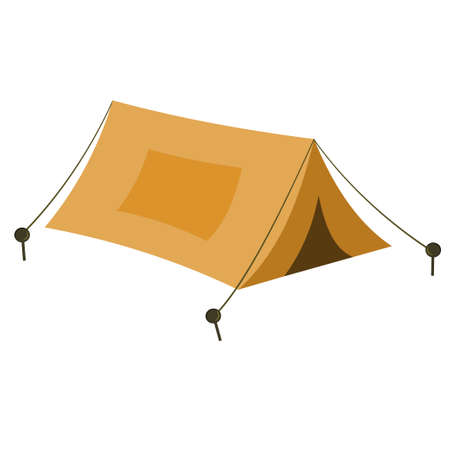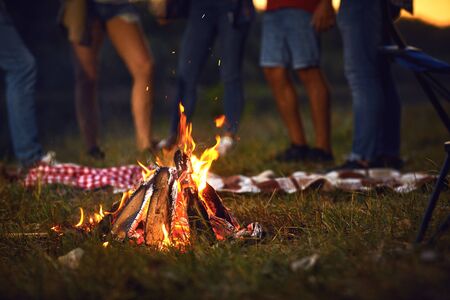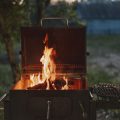1. Choosing the Wrong Tent
One of the most common mistakes new campers make is picking the wrong tent. It might seem like any tent will do, but the right one can make or break your camping experience. Beginners often go for a tent that’s too small, not suited for the weather, or overly complicated to set up.
Size Matters
Tent sizes can be misleading. A “4-person” tent might technically fit four people sleeping shoulder-to-shoulder, but it won’t leave room for gear, backpacks, or any personal space. A good rule of thumb is to choose a tent rated for at least one person more than your group size.
| Group Size | Recommended Tent Size |
|---|---|
| 1 person | 2-person tent |
| 2 people | 3- or 4-person tent |
| Family of 4 | 6-person tent |
Match Your Tent to the Weather
If you’re camping in cooler months or areas with unpredictable weather, make sure your tent is built for those conditions. Look for features like a full rainfly, strong poles, and solid waterproofing. A cheap summer tent won’t cut it if there’s wind and rain involved.
Ease of Setup
The last thing you want after a long drive to your campsite is spending an hour figuring out how to pitch your tent. For beginners, simple pop-up or two-pole dome tents are great options. Practice setting up your tent at home before heading out—it’ll save time and frustration later.
Quick Tips:
- Always check reviews for ease of setup and durability.
- Consider height—being able to stand up inside can be a game changer.
- Ventilation matters—look for windows or mesh panels to reduce condensation.
Selecting the right tent ensures you’ll sleep comfortably and stay dry no matter what nature throws at you on your first camping trip.
2. Overpacking or Underpacking Gear
One of the most common mistakes beginners make on their first camping trip is either packing way too much or forgetting important gear. It’s easy to get overwhelmed and start tossing in everything that “might” come in handy, but that only adds unnecessary weight and clutter. On the flip side, not bringing enough—like leaving behind a sleeping pad or flashlight—can turn your outdoor adventure into an uncomfortable experience.
The key is to stick to a reliable checklist and focus on packing multi-purpose items that serve more than one function. This helps cut down on bulk while ensuring you have what you truly need.
Common Overpacked Items
- Too many clothes (especially bulky jackets)
- Multiple cooking tools and utensils
- Extra gadgets and electronics
- Large coolers with excessive food
Commonly Forgotten Essentials
- Sleeping pad or air mattress
- Flashlight or headlamp (plus extra batteries)
- First-aid kit
- Trash bags for waste
Helpful Packing Tips
- Pack clothing in layers instead of heavy jackets
- Choose items that serve more than one purpose (like a spork or a pot that doubles as a bowl)
- Pre-plan meals so you only bring what you’ll actually cook
- Test your gear before the trip to make sure it works properly
Basic Gear Checklist for Beginners
| Category | Essential Items |
|---|---|
| Shelter & Sleep | Tent, sleeping bag, sleeping pad, tarp or footprint |
| Cooking & Food | Portable stove, fuel, lighter/matches, pot/pan, utensils, cooler (if needed), biodegradable soap |
| Lighting & Navigation | Flashlight/headlamp, extra batteries, map or GPS app, compass (optional) |
| Clothing & Personal Items | Layered clothing, rain jacket, toiletries, sunscreen, bug spray |
| Safety & Extras | First-aid kit, multitool or knife, trash bags, water filter or purification tablets |
A well-balanced pack makes for a smoother and more enjoyable camping experience. Keeping it simple ensures you’re prepared without being weighed down by things you won’t use.

3. Ignoring Weather Prep
One of the most common mistakes first-time campers make is not preparing for the weather. It’s easy to get caught up in planning meals and choosing a campsite, but if you don’t check the forecast or pack appropriately, your trip can go south real fast.
Weather can change quickly—especially in the mountains or during shoulder seasons like spring and fall. Even in summer, temperatures can drop at night, and unexpected rainstorms are always a possibility.
Why Weather Prep Matters
- Comfort: Being cold or wet can turn a fun trip into a miserable one.
- Safety: Hypothermia is a real risk if you’re not dressed properly, even in mild weather.
- Gear Protection: Rain and moisture can damage your gear if it’s not stored correctly.
Must-Have Items for Weather Readiness
| Item | Purpose |
|---|---|
| Rainfly | Keeps your tent dry during rainstorms |
| Waterproof bags or dry sacks | Protects clothes, food, and electronics from water |
| Layered clothing (base layer, mid-layer, outer layer) | Helps regulate body temperature in changing conditions |
| Poncho or rain jacket | Essential for staying dry when outside the tent |
Quick Tips
- Check the weather forecast 24–48 hours before your trip—and again right before you leave.
- Always pack extra socks and a warm hat—even in summer.
- If youre heading to higher elevations, be prepared for colder nights regardless of daytime temps.
A little prep goes a long way. Don’t let poor planning around weather ruin your first camping experience. Bring the right gear and you’ll stay safe, dry, and comfortable no matter what Mother Nature throws at you.
4. Bringing Cheap or Unproven Gear
When you’re just starting out with camping, it’s tempting to buy the cheapest gear you can find or borrow items you’ve never used before. While that might save money upfront, it can quickly turn your trip into a frustrating experience. Cheap gear often lacks durability and comfort, while untested equipment might fail when you need it most.
Why Quality Matters
Your core camping gear—like your tent, sleeping bag, and stove—should be reliable and built to handle outdoor conditions. A leaky tent or a sleeping bag that doesn’t keep you warm can ruin your entire night. Spending a little more on these essentials can make a huge difference in comfort and safety.
Test Before You Go
Even if you’ve bought good-quality gear, make sure to test everything before your trip. Set up your tent in the backyard, light your camp stove, and sleep in your sleeping bag for a night indoors if needed. This helps you learn how everything works and ensures there are no surprises at the campsite.
Recommended Essentials to Invest In
| Gear Item | What to Look For |
|---|---|
| Tent | Waterproof, easy setup, fits your group size |
| Sleeping Bag | Rated for the expected nighttime temperatures |
| Sleeping Pad | Cushioning and insulation from the ground |
| Camp Stove | Reliable ignition, fuel-efficient, easy to use |
Pro Tip:
If youre not ready to invest heavily yet, consider renting quality gear from an outdoor store or borrowing from an experienced friend—but always try it out beforehand.
5. Forgetting About Campground Rules and Etiquette
When youre heading out on your first camping trip, its easy to get caught up in gear prep and overlook one crucial detail: campground rules and etiquette. Not knowing these guidelines—or ignoring them—can lead to a frustrating experience for you and others. Worse, it can attract wildlife or even put you in danger.
Why Campground Rules Matter
Campgrounds often have specific regulations in place to protect both campers and the natural environment. These may include quiet hours, pet policies, fire restrictions, and waste disposal methods. Failing to follow these rules can disturb other campers or cause environmental damage.
Common Campground Mistakes Beginners Make
| Mistake | Why Its a Problem | What to Do Instead |
|---|---|---|
| Leaving food out overnight | Attracts wildlife like raccoons or bears | Use bear-proof containers or store food in your car |
| Ignoring quiet hours | Disturbs neighbors trying to sleep | Keep noise down, especially after dark |
| Littering or leaving trash behind | Pollutes the area and attracts animals | Pack out all trash and follow Leave No Trace principles |
| Letting pets roam off-leash | Can be dangerous for pets and annoying to others | Keep pets leashed and under control at all times |
The Importance of “Leave No Trace”
The Leave No Trace principles are essential for every camper, especially beginners. They’re not just about being polite—they help preserve nature for everyone. These include things like disposing of waste properly, respecting wildlife, minimizing campfire impact, and being considerate of other visitors.
Quick Tips for Good Campground Etiquette:
- Always check posted rules when you arrive at a campsite.
- Avoid playing loud music or using bright lights late at night.
- Stick to designated trails and campsites.
- If youre unsure about something, ask a park ranger or host.
Your gear might be top-notch, but if you forget about campground etiquette, your trip could still go south. Respect the space, the people around you, and the environment—and youll set yourself up for a great outdoor experience.

